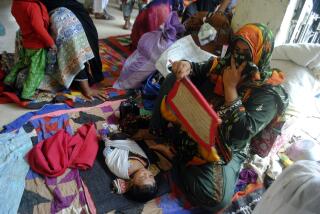Six Billionth Person May Need a Home
- Share via
VISOKO, Bosnia-Herzegovina — The world’s 6 billionth person is just a knock on the door away from joining the legions of Bosnians with no place to call home.
Little Adnan Mevic’s fortunes looked a lot better when he was born two minutes after midnight Oct. 12 in Sarajevo, Bosnia-Herzegovina’s capital.
United Nations Secretary-General Kofi Annan was in the capital on official business and needed a baby to pose with because U.N. demographers had decided that the 6 billionth person would enter the world on that day.
U.N. officials settled on the child born to Fatima Mevic, 30, who was still trying to get over the shock of her first birth when she was brought out in her dressing gown to shake hands with Annan in front of the cameras.
Mevic and her husband, Jasminko, 37, were so thrilled by the honor that they named their child after the U.N. chief: The closest Bosnian Muslim name they could find was Adnan.
“Let me wish you and your family, but most of all your beautiful son, a long, healthy, prosperous and peaceful life,” U.S. diplomat Jacques Klein, the top U.N. official in Bosnia, wrote on a card sent to the Mevics.
With the global news coverage came plenty of attention and presents, such as a silver U.N. coin set in a clear cube, a stuffed purple Teletubby toy, a 10-day vacation on the Croatian coast and a year’s supply of disposable diapers.
None of which solved the Mevics’ problem: Both parents are jobless and living in an apartment here owned by a Bosnian Serb who was forced to flee during the war and now wants the occupants evicted.
Under Bosnian laws written to reverse “ethnic cleansing,” a judge can order police to remove the Mevics at any moment. For three months, the family has tried to reach Klein to plead for his help but hasn’t received a phone call.
“I feel forgotten by international officials and by the authorities in general,” Jasminko Mevic, a burly unemployed blacksmith, said through a translator. “The only people who are visiting us now are journalists.”
Klein’s spokesman, Douglas Coffman, said Thursday that the family had been sent a message saying Klein would schedule a meeting with them for Thursday.
There is no guarantee the Mevics will get anything but his sympathy.
Nearly five years after the end of Bosnia’s war, more than 1 million refugees still can’t return to their homes. In most cases, someone is living in the space, ethnic extremists make a return too dangerous or the buildings haven’t been repaired.
“The [Mevic] family really denotes the problems that face many people in this country, and housing is at the top of that list,” Coffman said.
The growing housing problem is largely the result of a more aggressive campaign to evict refugees from the homes they moved into after being forced to abandon their own, many of which were torched during Bosnia’s 3 1/2-year war.
By the beginning of May, 12,579 refugees had returned this year to areas where they were ethnic minorities--four times the number of returnees over the same period last year.
“This dramatic upsurge in returns--although still below desired levels--has caught the international community unprepared in two key areas: reconstruction assistance and security,” researchers at the International Crisis Group, an independent watchdog organization, concluded in May.
The Mevics said they know the Serb who owns the small apartment they took over after he fled to Banja Luka, capital of the Serb-controlled entity that makes up almost 49% of postwar Bosnia.
He is a family friend in his 60s who wants to sell the apartment for just over $16,500 because he doesn’t plan to move back into this mainly Muslim town about 15 miles northwest of Sarajevo, Jasminko Mevic said.
Mevic can’t afford to pay anything near that. The family’s only source of income is about $88 a month in young mothers’ benefits, which end when Adnan turns a year old in October, and $111 more a month from the city of Sarajevo, which will continue to provide the funds until Adnan turns 18.
The boy’s father would rather have a job, and a chance to buy his family a home.
“Those who grabbed money during the war have something, and those who worked honestly had nothing to save,” he said. “So what can a person do?”
More to Read
Sign up for Essential California
The most important California stories and recommendations in your inbox every morning.
You may occasionally receive promotional content from the Los Angeles Times.













